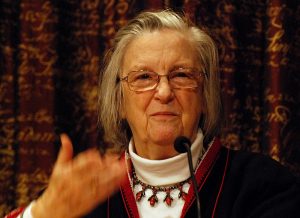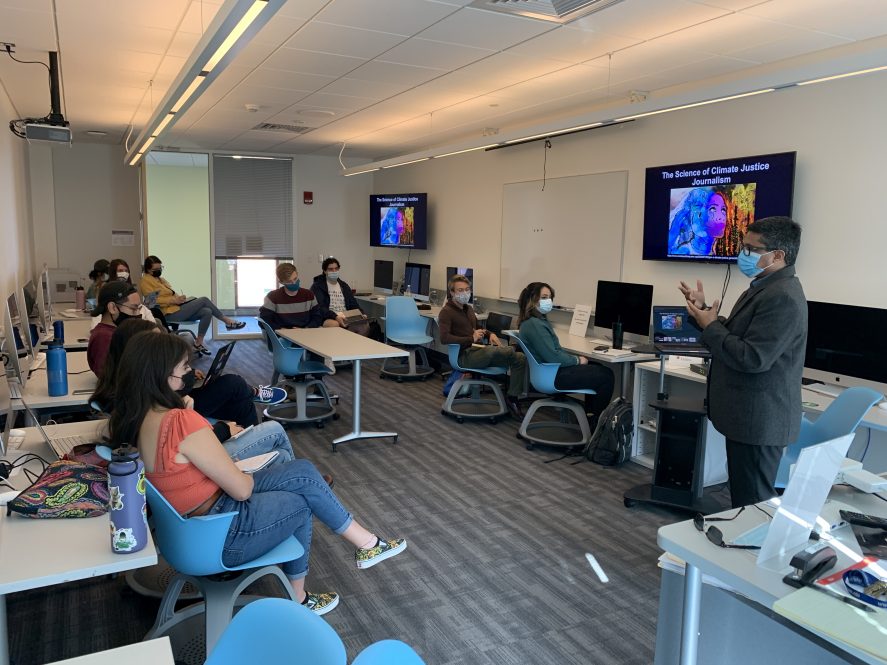Action to combat climate change requires a reimagining of our world, obliging us to really grapple with human nature, politics, and society, and ask a series of fundamental questions. Who controls the world’s forests, natural resources, and common spaces? Governments or corporations? What about the people who have lived on the land for generations? Are these global life-sustaining ecosystems or sources of profit, and who gets to make those determinations?
These deeper issues are at the heart of a sustainable and just future. Prakash Kashwan, Associate Professor of Political Science and Co-Director of the Research Program on Economic and Social Rights, Human Rights Institute at UConn, is working to find answers.
An Outdated Idea
Kashwan says that many academics continue to think of commons in an outdated fashion that goes back to 1968, when biologist Garrett Hardin published the article “The Tragedy of the Commons”, which remains one of the most cited scientific essays of all time. This is problematic for a number of reasons, as scholars have shown that “Hardin was a racist, a eugenicist, and he was coming at it from a very anti-black, anti-poor, anti-global south perspective.”
Also, Hardin was not a social scientist, and his wildly popular article is criticized for oversimplifying the issues. His main argument was that resources should either be traded in the marketplace or controlled by the government. In the absence of top-down controls there will be tragedy, the argument runs, because human beings cannot discipline themselves and resources would be exhausted otherwise.
Kashwan is working to change this stubbornly popular view, and he recently published a paper in Current Research in Environmental Sustainability describing the body of current commons scholarship.
Kashwan’s commons research started when he was a master’s student studying forestry management. He read Elinor Ostrom’s 1990 book Governing the Commons, where she proposed a framework to dismantle the arguments posed by Hardin. Ostrom’s work captured Kashwan’s interest and set him on a path that would eventually lead to him pursuing a Ph.D. with Ostrom as his advisor.
Ostrom examined hundreds of case studies and detailed over 100 studies of commons – roughly defined as shared resources – across the globe, ranging from the management of grazing lands to irrigations systems to watersheds, where communities sustainably utilize rather than deplete the common resources, says Kashwan.
“She said, ‘No, human beings are not trapped in a Tragedy of the Commons, and here are over 100 examples why.’”

Ostrom’s work was evidence-based and wove together game theory, theoretical models, economics, political science, and constitutional law to provide the theory of governing the commons.
“It’s called the ‘theory of the commons’ or theory of collective action,” Kashwan says. “Her main argument was that, when faced with challenges, communities and different actors get together and they design their own systems.”
Kashwan explains that collective action happens every day, and can be something as simple as drivers obeying traffic signals. If no one is watching, we (hopefully) still stop at a red light because there are potential personal and societal costs of not doing so, such as causing crashes, injury, death, or disruptions for ourselves and others.
“How do self-interested human beings negotiate these kinds of costs and benefits, not strictly in a marketplace, but in social situations where there is a tendency to fail?” Kashwan asks. “When you don’t follow the traffic sign, you are free-riding on this kind of societal agreement, that we should all follow the stop signs. That’s the fundamental question that Ostrom addressed.”
Adding Context and Reimagining for Justice
For this work, Ostrom was awarded the 2009 Nobel Prize in Economic Sciences, making her the first woman to win an economics Nobel. Others, like Kashwan, are carrying on Ostrom’s work fighting against the misconceptions in the wake of the “Tragedy of the Commons.”
Kashwan experienced working with communities and government agencies where there was a great deal of conflict around natural resources.
“Government agencies are supposed to be public servants to act in the public interest, but the agencies themselves become interested actors; they don’t necessarily always act in the public interest,” he says.
Agencies are also fallible. Kashwan explains that Ostrom assumed this to be true in many instances, since actors in society play by the rules within their own margins of errors, which vary in different contexts. To illustrate the importance of context, Kashwan once again draws on the traffic signal.
“If you travel to Delhi or Kampala, you might notice nobody follows traffic signs,” he says. “It’s an altogether a different reality, even though there are traffic rules that have been apparently agreed at the societal level, in that context. Does this mean that the theory of collective action is wrong? No, because Ostrom emphasized that individual and group responses are contingent on features of a specific context and the level of autonomy they have in responding to such a context. Even in perennially chaotic traffic situations, one can observe the emergence of norms that motorists and pedestrians develop to avoid accidents. However, Ostrom’s theory also recognized the importance of social and biophysical context, e.g., importance of improving road and pedestrian infrastructure in crowded cities.”
These concepts are popular because they work for the dominant. If you happen to be a powerful market or government actor, ‘Tragedy of the Commons’ is good because it advocates for you. — Prakash Kashwan
The rule of law is one of the most important features of the social and legal context that shapes individual and group behaviors. Both powerful governments and corporations have tended to undermine the rule of law, especially in the global south, says Kashwan. This presents a challenge to Ostrom’s theory of commons, which assumes the existence of a Western liberal rule of law-oriented framework.
There’s a very different grammar of socio-economic transactions in the global south, says Kashwan. This big difference is one he is tackling: “I have been able to bring together the theories that Ostrom developed but also show how these theories may need to be adapted in the context of the global south.”
Kashwan looked at the management of large forest commons in India, Tanzania, and Mexico, and the status of traditional indigenous land rights for those living in the middle of these commons. Most people don’t realize that governments and government forestry agencies assert “ownership” of more than 90% of forest areas in Asia and Africa, even though Indigenous peoples and other rural communities have lived in these lands for generations, says Kashwan. The rights of these communities have never been formally recognized. Instead, governments and international agencies cited Hardin’s “Tragedy of the Commons” theory to centralize control over forest commons. Governments have then handed over these lands to corporations involved in mining, logging, and commercial plantations.
“I add the question of justice, as government agencies use the same laws set up by the colonial governments, for control of people and resources. The [colonial] laws were continued by the post-independence governments and government agencies,” says Kashwan.
A Civilization-scale Opportunity
These questions are coming to the forefront with new issues like carbon offsets. Climate-conscious consumers paying an airline to offset emissions from a trip may not realize the offsets are often funding forestry agencies mandated to protect forests.
On the surface, these efforts seem good. However, Kashwan says, “Your ‘climate consciousness’ empowers these exploitative actors or agencies. As a consumer, you have no idea of how forest conservation happens. Instead of effectively protecting the ecosystems and climate, carbon offsets have shown to produce fake carbon credits, while also at the same time contributing to the land and human rights violations of local communities. These spurious credits happen because we live in a world now suddenly connecting these previously disconnected realities.”
This is why reimagining the commons and working to dispel the arguments made in “The Tragedy of the Commons” is necessary, says Kashwan. These problems are at the center of global conservation, global development, and climate mitigation and adaptation.
“Even though you are thousands of miles from the commons, you paid to become a stakeholder in that forest,” he says. “There are, of course, all kinds of implications of that, political implications, and especially in a situation where you can imagine an indigenous family who’s lived for generations in that forest, now thrown out because that forest is now set aside as a carbon stock.”
This is a new tragedy where, as polluters, Kashwan says we are now able to pay our way into rebranding ourselves as protectors of the commons and throwing out the communities that are shown to be effective stewards of those lands.
“These concepts are popular because they work for the dominant,” says Kashwan. “If you happen to be a powerful market or government actor, ‘Tragedy of the Commons’ is good because it advocates for you. Ostrom’s rules offer an entry point to examine these relationships and power differences and how different actors put checks and balances against one another.”
In collaboration with other scholars, Kashwan has recently launched the Ostrom Workshop Working Group on “Power, Inequality, and Justice in the Commons,” where they hope to advance theoretical and policy-relevant research on the commons.
“There are both opportunities and threats in the current moment,” he says. “There’s a fundamental, civilizational-scale opportunity here but it only works if we get these things right.”



